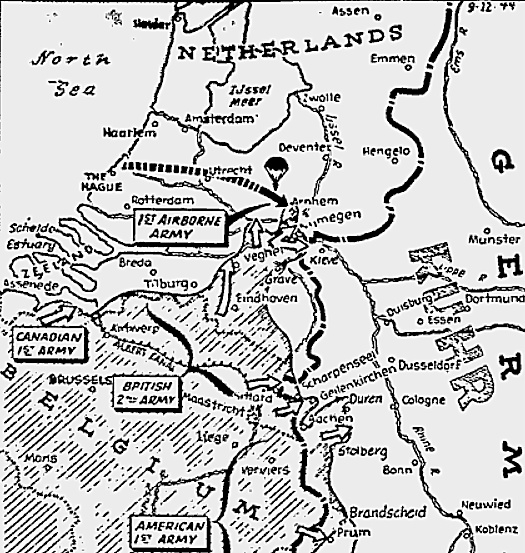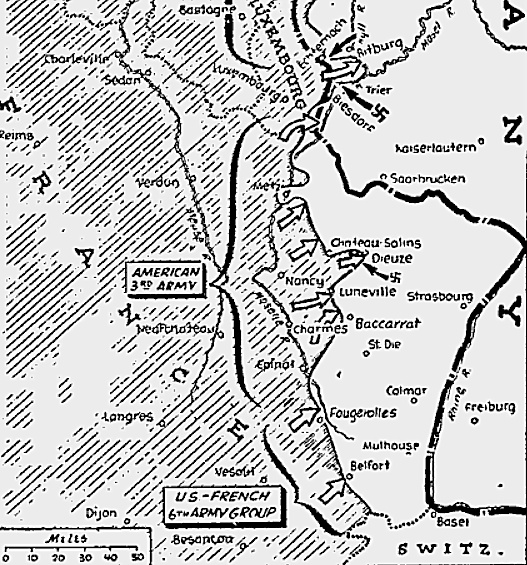Yanks beaten back in Reich
First Army mops up inside Stolberg, but falls back in south
By Virgil Pinkley, United Press staff writer


Bitter resistance was met by Allied forces on the Western Front. The U.S. 1st Army was forced to retreat above Trier, but was mopping up the Germans in Stolberg, near Aachen. The U.S. 3rd Army was engaged in a fierce tank battle near Château-Salins. The British 2nd Army battled furiously to relieve a British airborne force at Arnhem, in the Netherlands, which was reported in a critical plight. 1st Canadian Army troops mopped up along the Scheldt River estuary, while the Allied 6th Army Group on the south fought off German attacks near the Belfort Gap.
SHAEF, London, England –
A heavy German counterattack has forced back U.S. 1st Army troops northwest of Trier, it was announced officially today, and British airborne troops fighting against heavy odds in the Arnhem area of Holland are in a “critical” plight.
A dispatch from Stolberg, 612 miles east of Aachen, said U.S. forces were mopping up the northern section of the city as the Germans tried to move out an aircraft parts factory.
Latest reports to Headquarters said German artillery was pounding the Arnhem “island” of British troops dug in on the north bank of the north branch of the Rhine while a relief column of British 2nd Army tanks struggled vainly to puncture the constricting Nazi noose.
A dispatch from the Arnhem pocket at 9:00 a.m. reflected the desperation of the situation there, the correspondent marveling at what has kept the British going since Sunday and saying that “only one thing is certain – they will keep going until the 2nd Army gets here.”
A German dispatch broadcast by the Berlin radio described most violent fighting in Arnhem, key stronghold commanding the approaches to northwestern Germany, which had been raging since Sunday, indicating that the British had captured the town but were unable to consolidate their victory.
Headquarters sources said that on the right wing of Lt. Gen. Courtney H. Hodges’ 1st Army front near the center of the Luxembourg-German frontier the Americans had been forced to pull back an undisclosed distance.
The setback came in the sector east of Diekirch, 23 miles northwest of Trier and 12 miles northwest of Echternach. The significance of the strong counterassault by the Nazis on their home soil was not apparent immediately.
The British airborne force which dropped down in the Arnhem area Sunday was disclosed to hold a sector stretching westward from the city along the north bank of the river.
The exact depth and width of the island was not disclosed.
A battle of extreme violence was going on in the wet, hazy reach of pastureland between Arnhem and Nijmegen, 10 miles to the south, where the Allies forced the Rhine and struck up toward Arnhem.
Hopes raised by unofficial reports that the 2nd Army had established a tenuous link with the Arnhem pocket were dashed by the dispatch from the Arnhem area and the subsequent lack of any report at headquarters on a junction.
The relief column ran into heavy resistance two miles north of Nijmegen – eight miles short of Arnhem – and up to the noon hours today had not been able to break the stalemate there, headquarters sources reported.
The plight of the Arnhem forces was intensified by a bad turn in the weather which cut down the reinforcement missions flown by Allied planes. Yesterday the air forces carried in a substantial number of troops.
The Germans were revealed to have been counterattacking the U.S. 1st and 3rd Armies all along the front from north of Aachen to south of Lunéville.
The 1st Army withdrawal east of Diekirch was in sector where one of the deepest penetrations of the Reich had been made. It was not clear whether the spearhead was still inside Germany.
North of Aachen, a counterattack near Geilenkirchen was repulsed without loss of ground. Southeast of Aachen, slow progress was reported in the drive through the Hürtgen Forest against green camouflaged pillboxes and roadblocks. The battle was centered about five miles southeast of Stolberg.
Lt. Gen. George S. Patton’s veteran U.S. 3rd Army was locked in a swaying tank battle east of the Moselle River that outmatched in fury anything yet seen in the western campaign.
After five days of reckless counterattacks that failed to halt the eastward progress of Gen. Patton’s spearheads, the Nazis hurled fresh panzer divisions into the fight this morning and wheeled up strong artillery forces to support the counterblow. The Yanks destroyed 246 German tanks in the five days.
Guns move up
Pooled dispatches filed late yesterday from the Arnhem sector said British artillery had reached the area just south of the Rhine estuary and was shelling German assault positions around the beleaguered sky troops.
Radio Berlin continued to trumpet obviously exaggerated claims of losses inflicted on the Arnhem pocket. After admitting the juncture, Berlin said the British 1st Airborne Division at Arnhem had been “completely liquidated” and then announced that the “liquidation” was still in progress.
United Press writer Ronald Clark reported from the 2nd Army front that increasing numbers of British tanks, with U.S. paratroops and British infantrymen riding their turrets, were moving across the Nijmegen bridge to join in the battle to the north.
Batter lifeline
German tanks, troops and artillery battered at the narrow lifeline stretching up 55 miles from the Belgian border to Arnhem, and Mr. Clark reported that the enemy attacks were mounting in force.
A headquarters communiqué said British and U.S. troops were steadily widening the base of their salient jutting across the Belgian-Dutch border, pushing 16 miles beyond Eindhoven to Someren on the east, and six miles westward to Wintelre.
On the 3rd Army front, Gen. Patton sent his armored divisions lunging eastward within 25 miles of the Siegfried Line and ran head-on into a great concentration of German panzers massed on the open plains between Château-Salins and Dieuze.
Gain near Metz
North of the Château-Salins–Dieuze battle, 3rd Army infantrymen hacked out small advances in the thickly-defended arca around Sillegny, six miles south of Metz. To the south, other tank and infantry forces cleared the Germans from Lunéville and pushed out along the Meurthe River 15 miles southeast of that town to the Baccarat area. Flin, five miles northwest of Baccarat, was captured yesterday.
On the U.S. 1st Army front, machine-gun squads fought the Germans step by step through the ruins of Stolberg. Aachen was still under siege, although unconfirmed reports said the Germans were beginning to evacuate the city through a narrow gap in the American lines to the northeast.
Canadians take port
First Canadian Army forces in the Schelde Estuary sector along the northwestern border of Belgium and the southwestern Dutch frontier captured the Dutch port of Terneuzen and mopped up German pockets along the south bank of the Schelde.
On the U.S. 7th Army front at the southern end of the battle line, U.S. troops pushed into the western end of the Belfort Gap against steadily stiffening resistance.
At last reports, the doughboys were barely 12 miles west of Belfort after capturing the village of Palante in a 3½-mile advance from Lure. French troops moving up from the south, however, were forced to withdraw slightly in the Vermondans area, 17 miles below Belfort.



